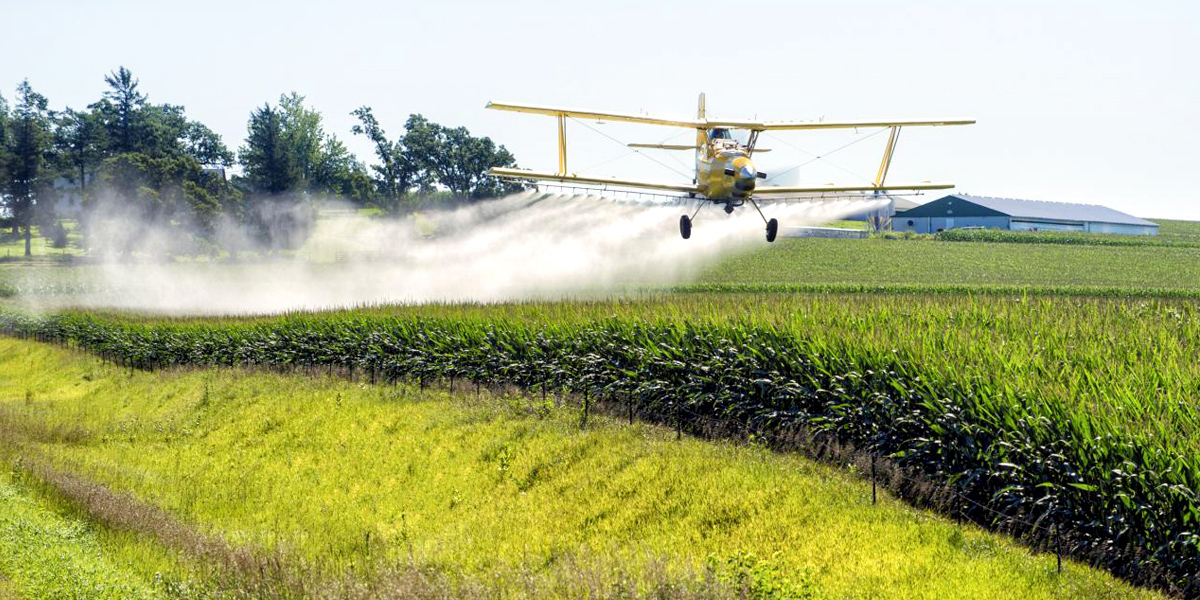

Farmers, conservation groups and food and farm justice organizations stood up today to protest against the contamination of rural communities, our food supply and the environment by filing a federal lawsuit against the Trump administration.
The groups are suing the U.S. Environmental Protection Agency (EPA) under new administrator Scott Pruitt for approving Dow AgroScience’s Enlist Duo, a mixture of the weed-killing chemicals glyphosate and 2,4-D—both of which are known to be highly toxic. The novel combo pesticide is sprayed directly on corn, soybean and cotton plants that are genetically engineered by Dow specifically to survive exposure to the pesticide. The EPA approved the use of the pesticide in 34 states.
Farmers will be hit hard by the human health damages of Enlist Duo and are put at risk financially by 2,4-D’s known tendency to volatilize, drift and damage neighboring crops. The U.S. Department of Agriculture projects that Enlist Duo’s approval will lead to as much as a seven-fold increase in agricultural use of 2,4-D—a component of the infamous Vietnam-era defoliant “Agent Orange,” which has been linked to Parkinson’s disease, non-Hodgkins lymphoma and other reproductive problems. The other component of Enlist Duo is glyphosate, the active ingredient in Monsanto’s flagship pesticide Roundup. Glyphosate was classified as a probable human carcinogen by the World Health Organization in 2015.
“Scott Pruitt and the Trump administration are endangering farmers and the environment by caving to Big Ag and approving this highly toxic pesticide combo,” said Sylvia Wu, staff attorney for Center for Food Safety and legal counsel in the case. “Fortunately, we have laws written to protect farmers and the environment, and we intend to have the Court enforce them.”
https://twitter.com/EcoWatch/status/840215912519200768 expand=1]
This is the second lawsuit the groups have had to bring over the product. After the groups challenged its initial approval in 2014, the Obama Administration agreed to reanalyze some of its impacts. Unfortunately, the EPA then reaffirmed its original approval and dramatically expanded it, allowing Enlist Duo to be sprayed in more than twice as many states and on cotton in addition to corn and soybeans.
“EPA knows that spraying a hundred thousand tons of this pesticide on millions of acres every year will threaten the survival and recovery of some of our most iconic endangered species, but it refuses to follow the law that protects them,” Earthjustice attorney Paul Achitoff said. “We will hold EPA accountable.”
Enlist crops and Enlist Duo are part of a disturbing, industry-wide trend where crops are genetically engineered to withstand multiple pesticides, allowing pesticide companies like Dow and Monsanto to sell both expensive GE seeds and large quantities of the pesticide cocktails that are sprayed on them. While these GE crop systems initially provide a quick-fix way to kill weeds, the intensive spraying triggers rapid evolution of weed resistance to the chemicals. Just as overuse of antibiotics breeds resistant bugs and more antibiotics to kill them, so these GE crop systems drive a toxic spiral of increasing weed resistance and pesticide use.
In addition to health risks, significant crop damage from pesticide drift and increases in both weed resistance and pesticide use, spraying Enlist Duo on millions of acres will contaminate waterways and important wildlife habitat. EPA’s own assessments found that Enlist Duo is highly toxic to numerous plants and animals, including endangered and threatened species found in or near agricultural fields.
“In reissuing an expanded approval for this toxic chemical cocktail, the EPA has shown an utter disregard for human health, our drinking water and endangered species like the iconic whooping crane,” Stephanie Parent, senior attorney at the Center for Biological Diversity, said.
The petitioners bringing the lawsuit are National Family Farm Coalition, Family Farm Defenders, Pesticide Action Network North America, Beyond Pesticides, Center for Food Safety and Center for Biological Diversity, represented jointly by legal counsel from Earthjustice and Center for Food Safety.
[facebook https://www.facebook.com/EcoWatch/videos/1461122080567391/

 233k
233k  41k
41k  Subscribe
Subscribe 